The Royal Navy has awarded BAE Systems a contract to integrate the Flexible Tactical Uncrewed Aerial System (FTUAS) into the Type-23 frigate’s Combat Management System.
FTUAS is an Urgent Capability Requirement and the aim is to deliver a maritime Uncrewed Air System (or drone to you and I) fitted with radar and Electro-Optical/Infrared (EO/IR) sensor capability that will be deployable from a T23.
As part of the User Requirement, the track data, video streams and AIS from these sensors must be integrated into the T23 CMS to enhance command Situational Awareness (SA) and decision making.
According to the contract notice statement of requirements, there is a requirement to develop software and procure hardware to integrate data streams from the Flexible Tactical Uncrewed Aerial System into its host Type 23 frigate “which is permanently based overseas”.
“The purpose of the FTUAS programme is to deliver organically generated ISR to the
ships Command such that they are able to FIND, FIX, TRACK and ASSESS crewed and
uncrewed surface points of interest at range from the parent ship, creating an increased
response time. Integration into the T23 Combat Management System (CMS) is critical to
achieving this.”
The contract notice goes on to explain the specific requirements.
“The requirement is for the provision of software and hardware to incorporate FTUAS
radar tracks, AIS tracks and air vehicle data into the CMS tactical picture and for display of FTUAS full-motion video to meet the specific needs detailed in the FTUAS CMS SOR
(Appendix A).
The FTUAS data will be blended with T23 sensor data to provide a fuller Local Tactical Picture and contribute to the force picture via tactical data links.
In addition, the Operations Room staff must be able to independently select to display
the EO/IR data stream from the FTUAS, as required, to allow them to view Full Motion Video (FMV) and appropriate associated metadata.
There is a requirement for an accredited Security Enforcement Function (SEF) to be
supplied. This will act as an information filter/gateway between the FTUAS ground control
station (GCS) (through which the data is delivered to and from the air vehicle) and the T23 CMS, managing the passing of data from an OFFICIAL-SENSITIVE classification (at the FTUAS GCS) to a SECRET classification (T23 CMS).”
The life expectancy of the contract is 2 years from IOC with an anticipated IOC in Q1 2024 and an option for it to be extended by up to a further 2 years. However, the software and hardware used to integrate FTUAS data into the Type 23 CMS will remain in situ with the option for it to also be used on other platforms (or if FTUAS is taken up as a core capability). The software delivered will remain an enduring element of the BAES CMS-1 product family, the contract specifies.
“The Authority will retain the right to remove hardware associated with the fit, for installation on other platforms, as required. Supplier support to both the software and hardware element is required for 2.5 years from the time the CMS FTUAS upgrade occurs. The option to extend this on a year by year basis for spares and support is to be included.”
What is FTUAS?
A previous contract tender notice went into detail, explaining that the system will be used to counter Unmanned Surface Vessels in an operational theatre. It said:
“Flexible Tactical Unmanned Air System (FTUAS) Urgent Capability Requirement (UCR) for Royal Navy/Royal Fleet Auxiliary (RFA) forward presence shipping to counter Unmanned Surface Vessels (USVs) in an operational theatre. The requirement is for a capability to FIND, FIX, TRACK and RECOGNISE USVs operating alone, in large numbers or in combination with small manned vessels.
It is anticipated that the solution will permanently embark in shipping (including Type 23/Type 31/Type 45/LSDA/AO) to provide a persistent, intimate, integrated and assured capability to the parent unit. The ability to operate at sufficient range from its parent ship to facilitate timely decision making is anticipated as is the need for a maritime radar to satisfactorily deliver ‘FIND’.”


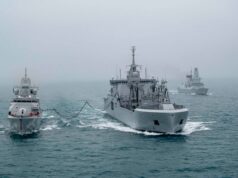
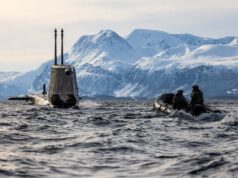
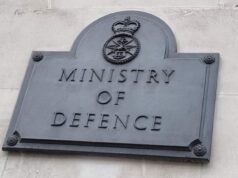

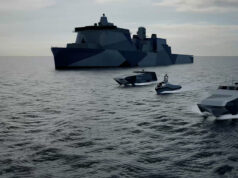
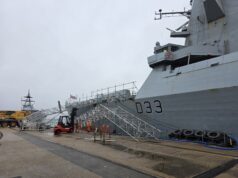
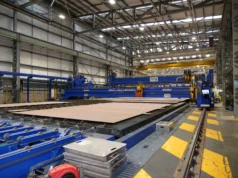
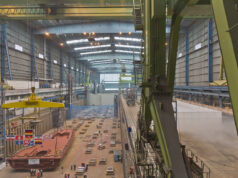

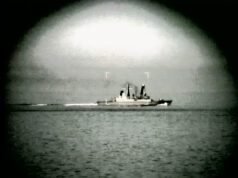

Radar would be a huge multiplier
Depending on circumstances ofc.
As long as the drone uses EO/IR it remains relatively stealthy. As soon at it switches on a radar it will alert an opponent to its presence (and potentially location).
An Australian company, Sentient Vision, has a system called “Vidar” that has been tested on a Schiebel S-100. The name is an abbreviation of “Visual radar” and it’s essentially claiming to be robust visual object recognition capable of decluttering in tricky sea states. If it works as advertised, and they do quote the RAN and the US coast guard as customers so presumably it does, that might be an interesting augmentation for wide area surveillance roles such anti piracy/drug-smuggling roles and general situational awareness – https://www.sentientvision.com/products/vidar-for-uas/
Depends on how powerful the radar is and what it’s tracking.
I assume this will be mainly aimed at policing roles tracking drug traffickers etc, so being stealthy isn’t really needed.
If it’s for a war situation, then it would need to powerful enough to outrange anti air missiles, at which case I assume it would be too big for a drone. Although if it had land tracking capability as part of the radar then it could be useful for the marines.
That would only matter in a war scenario, LPI radars reduce that risk. Depends on the type. Small AESA sets could go in a drone.
In a war situation the drone itself would be hard to hit, especially if it scanned, fixed a target, then drops to wave top height.
Drone scans the sea, detects a target, Type 23 fires CAMM in anti surface mode and it strikes the patrol vessel at 25km. Useful.
EO/IR could probably detect out to 25km passively and may be able to cue a missile without the ship having to use its own radar.
I was obviously thinking in terms of a peer war situation, I did say that it would depend on circumstances.
That is not going to happen.
I would hope we have the same capability ask for Tacticos on the T31s too. In the meantime can we not just operate more drones across all of our platforms even if not integrated. Ukraine and Azerbaijan has proven that they are now to stay. We should have something like Schiebel S100 as standard on our all ships from, with the option to add martlet.
^All of our ships from the rivers upwards. It is a massive multiplier of capability.
…and the benefit of having CMS in the River B2s becomes apparent! Bae have been working will Malloy on a heavy lift drone for a while ??
AA
It’s will be an amazing addition to the rivers as it’s exactly that capacity a constabulary vessel needs.
I agree and using them whatever their current limitations will give immeasurable feedback for whatever specialist systems follow or indeed their own adaptation to meet that eventual requirement. I always get the impression we try design the perfect system ( limited to budget) on the digital drawing board which inevitably fails to meet expectations or budget often as a result of outside experience from others changing the specs and anticipated use scenarios all the time.
Why not just get on and order some Schiebel or similar? We will deploy more than 1 vessel! The thing works it is in use elsewhere. Or for the RB2s in their wider CP/drug interdiction roles.
We seem to endlessly pussyfoot around.
Hi Daniele,
The navy is playing catch up, but it seems to be making progress.
I actually saw this as good news – mind you I have just come across to this article from Ajax so the bar is pretty damn low.
The point is integrating the data into the CMS will be a critical enabler and software has to be written properly.
I got the distinct impression that the Gulf was front an centre in the navy’s thinking behind this UCR. It does represent an accelerated introduction into service compared to conventional procurement roots. 2024 is only 18 months away after all.
Cheers CR
I was reverse, did this one first. Agreed, obviously the gulf.
I appreciate the complexities. Though even a commitment to expand the capability to other vessels later would be encouraging, and it’s never there to my eyes.
I’ve been “corrected” 😆 before regards UAV, it’s so slow it’s glacial, they were testing back in the 2000s. Itd a bugbear for me like Ajax for most.
Cheers for the explanation.
If you look at Ukraine you can see why.
The Russian stuff isn’t a lot of use even against a mid level equipped Opposition.
The Turkish stuff is fine against junk but would easily be messed up by proper EW and countermeasures.
If you want an anti piracy aid that is all well and good.
If you want a battle winner that is something else.
Dm Ajax has just reared its head again on 1 o’clock news BBC 3.2 billion spent sp far not a penny more will be spent out of the 580 ordered only 24 have so far been delivered and those 24 are for training g purposes only 2017 the Ajax should have been in service if projrctions ate correct the MOD would see this being completed by 2030 Should of updated the Warrior Lts just hope that this UAV project, by BAE is on time and on budget Fingers crossed
It does state in the article that the capability has to be transferrable across platforms. Chin up.
I agree with you Daniele, just crack on with it, the Schiebel s100 has been around a long time and I am sure the RN have tested previously. From memory it can also carry a couple of small missiles (not sure which ones maybe martlet).
it is cheap in the scale of things and reality is we should have bought 100 5 years ago and be reaping the benefits of that order, but we didn’t and we are not.
The RN are actually pretty good at balancing their budget, and have brought the onboard some stunning tech lately. But they do seem that be taking an age with their unmanned system efforts.
CR wrote:
Heres a short video from 1942. Granted not a drone, even 20 years later (little Nelly) the potential was endless, yet we never bothered to follow up:
Autogyros are fine u til the conditions get rough. Simply don’t have the full controls of a cab.
Hi CR we trialled the Scan Eagle which is now RQ-21 Blackjack the launcher isn’t that big, the B2’s crane should be able to be used fro the capture wire and it shouldn’t be that hard to fit adapt cranes on frigates. which i think provides longer duration for surveillance, of course having armed S-100 to respond with would be massive capacity increase for B2’s or T-31 in places like gulf or Caribbean
The ground footprint for scan eagle is 2 x 20ft Iso containers. The launcher is big. The capture system is big. The electronics to receive the picture is also big.
It also needed civilian operators to be embarked and housed onboard. Its one of the reasons that the Air EMR was lost and converted to accommodation on T23
Precisely why reinvent the wheel when it’s easier to perfect wheels that you have.
Perhaps because something like Schiebel doesn’t meet RN needs for this role, targeted at T23/T31/T45/LSDA/AO and presumably T26/T83?
The Future Maritime Vision Force 2030 graphic illustrated the PROTEUS RWUAS taking on the AWS Find role from Merlin, while the latter is reserved for the Fix and Strike roles. Clearly not a Schiebel class capability, which is constabulary.
This PROTEUS role suggests the RN is after a MQ-8C Fire Scout class RWUAS, i.e. more like a 3-tonne class aircraft. Perhaps not so coincidentally Leonardo Yeovil has begun initial design work on a clean-sheet 3t-class unmanned rotorcraft demonstrator which could be flying by 2024. This will build on work carried out for MoD over the last decade under phases one and two of the Rotary Wing Unmanned Air System (RWUAS) Capability Concept Demonstrator programme.
https://www.flightglobal.com/helicopters/leonardo-helicopters-plans-new-unmanned-demonstrator-in-uk/143965.article
That’s fantastic, GHF. That’s exactly what we need Leonardo to be doing. Thanks for the link.
Look at the work that Leonardo have been doing with the RN over the years using the Solo RWUAS as well…
I preferred AW Hero to the Solo. The Solo’s payload is way too small for the aircraft. This demonstrator seems to rectify that. If they build it around a sensor/communication package as well as having weapon stations, it could be a Fire Scout beater.
Fire Scout C is equipped with two Osprey 30 radar antennas. Given that those radars are also built by Leonardo 350 miles away, I’m sure the demonstrator can do better. Rolls Royce do the same engine family for the Fire Scout and the Solo. So it’s not like the skill sets aren’t available here to improve.
We certainly do pussyfoot. I used to fly model planes, IC powered and we had this stuff 20 years ago!
FIND, FIX, TRACK and RECOGNISE
But as things stand no engagement.
Is this thing going to be tethered? A decent bit of height and the ability to stay up for some time would certainly add to the ship’s sight.
You mean a kite or a blimp?
https://militaryembedded.com/unmanned/power-electronics/tethered-uass-for-naval-surveillance-applications-in-trial-with-us-navy
https://www.thinkdefence.co.uk/2021/12/tethered-drones/
Thx. Every day is a school day 🙂
Interesting terms and conditions
https://api.army.mil/e2/c/images/2020/09/25/c925f336/size0.jpg
This design can be used on almost all Royal Navy ships and RFA ships.
The problem is the main system.
Currently, I think it would be efficient to write a virtual host program that can supervise the operating system of any ship as an auxiliary , guest.
– Additional commercial CPU + motherboard + Floating Point Unit or accelator = not FPGA eg) nvidia
This requires the ability to develop – operate, deploy and maintain an OS to use for years and decades of MOD.
However, using a commercial product can save you a lot of money.
In the difficult and costly system integration problem, .
If the CEC capability that can be developed while using drones and all ships and MODs can be connected in real time, the effect will be doubled with only two or three ships.
It’s like having 10 ships.
I think RAFs Raven is such a virtual host on their Nexus network. Last year they talked about working with the RN this year in this context.
good news
😃
Armed? It’s an addition to the sensor systems, not a weapons carrying system.
It can be armed with 2 Martlet if needed, which is probably ok for maritime constabulary work…
No doubt it’ll be fitted for but not with…
That headline caught me out to.
We know the versatility, we recognise the capability but did the Bayraktor (sp) not only find and fix the enemy but facilitated sinking as well?
Integration is something else, I agree.
Moving on, should not ever ship from Rivers up not have this capability?
Yes, which was at the heart of my “moan”
I think equipped with rather than armed with is a more appropriate headline unless it’ll eventually carry weapons
Yes Torpedoes.
So would this drone and CMS arrangement enable the RN to overcome their reservations about over the horizon targets for an AShM?
The RN does OHT using Helo. A Lynx and now Wildcat PID gave you the ability to passively ID targets at very extended ranges. However the aircraft where not integrated into the CMS so all reports where radio calls. This should automate the OHT tasking.
Got it. Thx. And the helo will also be freed up for other tasks.
Many of these silly comments assume that BAE aren’t one of the largest defence contractors in the world and don’t know how to do drones or systems integration. Guys, chillax
This is indeed good news, because last year they announced it would be a 3 year contract, not a 2 year one. Aiming to get it sorted by Q1 2024 is acceleration. Heck, in MoD terms it’s likely to net them an internal speeding ticket.
There’s a requirement for an ASW rotary as well, so I hope they also test it out on several platforms, like an MQ-8C Firescout and an RAF Protector as well. If each drone integration is done separately as opposed to working with a common interface, it’s going to take forever.
Hi can anyone advise. I know its properly down to cuts and costs. But aren’t we supposed to have helicopters on the back of this thing. I mean that’s what the landing deck and hanger bit is for, isn’t it? And if we are, wouldn’t that have weapons on it.
We do almost certainly a wildcat. The beauty of this platform is it is much faster to get up in the air and has greater loitering time (time in air)
this should be an additional craft that allows the wildcat to be used more efficiently. In that respect this is fantastic news.
This will allow a greater loiter time out at range.
It will leave the Wildcat to concentrate on weapon carriage and battering a target if needs be.
Have the Wildcats had their data links added yet, and when it does, will its radar picture be integrated into the frigate’s CMS?
This would be in addition to the ships helicopter.
thanks guys. its great to know its good kit but even better to know its in addition and not instead
I don’t understand why they have never invented some type of EO radar that is thethered to somewhere like a mast. Every so many metres must deliver a much further radar bubble?
Probably talking out of my head at sea, but we have one in operation from our incident vehicle in the police. It stays up for hours and draws power from the generator in the back of the vehicle.
Sounds eminently sensible.
In Afghan we had aerostat balloons. They had a pretty decent EO turret mounted to them and were used for over watch at places like Bastion, Kandahar, Bagram etc. They were usually are set between 2500 and 5000ft in altitude.
The aerostats worked as intended. However the one at Kabul, was partially to blame for the Puma 2’s fatal crash. They reckon the pilot and crew lost sight of the the aerostats cable and flew into it.
This is the problem with using Aerostars from ships, it will curtail you using the flight deck for anything else. As the aerostat moves about in the wind.
Yes, I remember them, but no good on a ship or better than the barrage balloon from WWII.
I was referring to a unit that is powered to maintain position over a ship rather than being pulled along at 5000ft.
The issue is the amount of power you need to push up the cable to do that in adverse conditions.
Once you start to do the maths of a ship pushing along at 20kts and a 40kts wind you soon find that that self weight of the cable is the limiting factor.
put areosat on a small freighter (the type they use for DEA in Caribbean can stay operational in up to 65kts https://en.m.wikipedia.org/wiki/Tethered_Aerostat_Radar_System) load with defensive weapons only it sails 5-10 miles from CSG/LRG
This ?
Aerostat Surveillance Trailer Revivor II | L Jackson & Co – Military vehicles for sale – We sell Ex Military Land Rovers, Ex army trucks, MoD Surplus, Ex Military and Nato Plant and Equipment for sale. We stock over 2000 items of army surplus vehicles and equipment. Established since 1950 (ljacksonandco.com)
Yarp. Though the one at Kabul was a Tank one, I believe.
Tether them to an unmanned RHIB towed 100m behind the ship.
I may be missing something here but how is it deployed and recovered?
Is the frigate armed with a radar, or a sonar?
This is a sensor platform.
The type 23 frigate? If u mean that it has a medium Range artisan 997 radar on top of the mast. They also have a hull mounted sonar 2050(I think) and 8 of the class have a towed sensor array that comes out a long cable at the back of the ship. There are also other navigation radars and other systems that all feed into the combat management system. This gives the operations room crew the ability to see what is going on from multiple sensors and have them nicely displayed together. The drone is an additional sensor that will feed into the combat management system.
That is the important bits. With individual sensors you get info but getting them all working together and showing you in an understandable format in the trickier bit
Correct, but they are not armed with them.
Weapons are arms.
You do seem rather obvious.
Is this de facto conformation that Lancaster will soon be heading to Bahrain to replace Montrose? Or conversely is it an indicator that she is the ‘next but one’, with another T23 filling the role for a couple of years first? The smaller the RN gets, the more secretive it has become where deployments are concerned.
Lancaster will replace Montrose. Its been known for some time. The aim is to replace the T23 eventually with a T31 in Bahrain.
Thanks, may I ask what’s your source? I haven’t seen anything official – not even a twitter tweet or a remark by a senior officer. Just informed speculation that it will be Lancaster next on boards/sites such as this.
I have worked on Montrose at least 6 FTSP maintenance periods for most of the time she has been deployed plus doing other defect repairs. I knew who the replacement was a long time before it was announced publicly. However until its widely reported in MSM or on the t’interweb net I don’t discuss it. Once it’s out there I consider it fair game.
With luck I can get up close to whatever system they fit later in the year when she takes over from Montrose.
I have noticed that the MOD now talk about UCR instead of UOR.
Any idea on the thinking behind the name change. We are still on Ops all over the world, so it could still be a UOR, or is it that this is new technology that they quickly want to bring into service, short cutting some phased of the CADMID cycle.
1) An additional capability to, but not a substitute for a helicopter.
2) What would be even better news is additional Merlins so that there are enough to go round, Merlin could be really useful in Drone control and processing of data in way a wildcat isn’t. In an asw role the drones could carry weapons and sonar boys and the Merlin and crew can proceess the data etc. The real limitation of what is envisaged for HMS Lancaster is the need for the drone to be close to the ship.
3) Does this mean Montrise will stay longer in the gulf?
You dont have ASuW with Merlin like you do with Wildcat. There are enough Merlins for the Tail Equipped T23s who concentrate on high end ASW. The other T23s without a tail who do ASW using the hull mounted sonar can do more ASuw with Wildcat.
Drones. Great. But they need to be armed. Little point detecting a threat at a respectable range when the frigate or warship in question doesnt have the means to prosecute the target.
Why does UKDJ continue to use out of date photos of UK RN ships? HMS Lancaster has been hugely refitted since this photo was taken, both for her defence radars and her weapons fit. For a journal of your standing, this is very unprofessional.
Because we can only use images we have the rights to use?
Understood, George, but as a professional web publisher, your audience needs to be able to rely on the fidelity of your information. I respectfully suggest that you should take steps to secure the use of up to date images. else you could lose credibility.
If you’re willing to pay for it?
It is another unsophisticated botch up like earlier attempts or a serious piece of well designed kit? Maybe better to get a bunch of drones from Amazon or rubber powered toy planes like before.